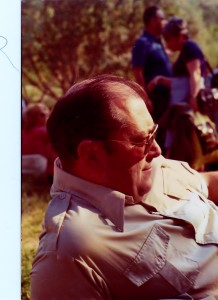For the past three years, I’ve watched my father struggle with age and debilitating disease.

July 31 1934 – November 29, 2012
My mother, his primary caregiver, also declined over this period, the emotional and physical strain causing her to age and struggle more than she might have otherwise.
We were blessed to have the assistance of several paid caregivers who not only took care of my parents, they loved them, sang to them, prayed for them.
In early September, my father was diagnosed with stage 5 kidney disease – e.g. kidney failure. Because he was not a good candidate for dialysis and certainly not for a transplant, my father decided that the quality of life he was enduring was not something he wished to prolong, we arranged for hospice to come in. With his diagnosis, he finally met the criterion: a terminal diagnosis (kidney failure) and the likelihood of dying within 6 months.
Many people don’t know that hospice – a different but additional layer of care – is completely covered by Medicare & Medicaid. (not room & board, but all the care). That meant that Dad received additional visits from and RN, a social worker, CNAs to help bath, feed, massage, dress him, change his colostomy bag and more. All care that my mother could be relieved of on a pretty regular basis.
Another thing people don’t seem to know about hospice is that even though the certification indicates that the patient is likely to die within 6 months, they may have longer. At the end of six months, the hospice agency can simply recertify them for another 6 months. Art Buchwald, the bestselling author and columnist was on hospice for over 2 years and was ultimately DISCHARGED from hospice because he got better.
Like Art Buchwald, my father also got better when admitted to hospice. There were no more arduous trips to doctor’s offices. They took him off many medications (many of which had deleterious side effects) and the increased hands-on personal care was terrific for his mental and physical health. Hospice paid for a hospital bed in the home. And to avoid pressure ulcers, it also paid for a special inflating mattress to alternate the pressure spots. It paid for pain medication & administration; it paid for medication to manage symptoms (like nausea, itching and others).
My father passed away after a sudden sharp decline on November 29th. Hospice was there to pronounce him and their social workers and CNA’s were there to help us with the emotional and practical issues.
My mother is now a widow. And she has many practical and emotional hurdles to overcome.
Now, the hospice bereavement counselors are staying in touch with my mother who finds herself, after 56 years, suddenly alone. After all those years, she finds herself with no one to take care of; and not sure how to take care of herself. A host of financial, practical and life questions lay before her.
Like many adult children, and not just an elder attorney, I find myself in a position where the roles are reversed – the children are now parenting the parents.
I’m honored to take on that role (with my siblings). I’m grateful for the assistance of the professional caregivers – both private and professional – who have assisted us in these long months of transition.
Rest in Peace Dad, your wife will be well cared for.